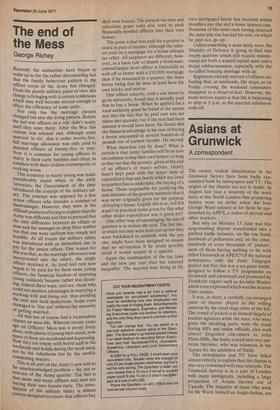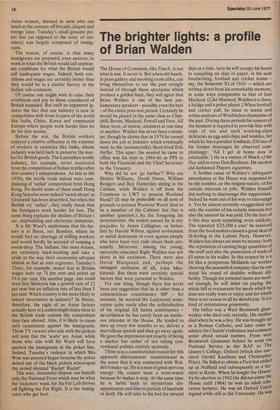Asians at Grunwick
A correspondent
The recent, violent disturbances at the' Grunwick factory have been badly represented both by newspapers and TV. The origins of the dispute are not in doubt. In August last year a minority of the work force at this North London film processing factory went on strike when the boss George Ward refused to let them be represented by APEX, a union of clerical and other workers.
But why on Monday 13 June was this long-standing dispute transformed into a pitched battle between, on the one hand, hundreds of policemen and, on the other, hundreds or even thousands of 'pickets', most of them having nothing to do with either Grunwick or APEX? Of the national newspapers, only the Daily Telegraph spelled out that this was a set-piece battle, designed to follow a TV programme on Grunwick and advertised and promoted by Trotskyist organs such as Socialist Worker which even explained which was the nearest Tube station.
It was, in short, a carefully pre-arranged piece of theatre played to the willing cameras by the usual stage army of the left. The crowd of pickets was formed largely of student agitators while the stars, who were given the speaking parts, were the usual boring MPs and union officials, plus such almost forgotten old-timers as John Platts-Mills, the fruity-voiced and very patrician barrister, who was infamous in the 'forties for his adulation of Stalin.
The newspapers and TV have failed almost entirely to explain that this dispute is also very concerned with race relations. The Grunwick factory is in a part of London with many immigrants, including a large proportion of Asians thrown out of Uganda. The majority of those who work for Mr Ward, himself an Anglo-Indian, are Asian women, dressed in saris who can lunch at the canteen off biryani, chapati and mango juice. Tuesday's small genuine picket line (as opposed to the army of outsiders) was largely composed of immigrants.
The reason, of course. is that many immigrants are prepared, even anxious, to work in what the British would call unpleasant conditions for what the British would call inadequate wages. Indeed, both conditions and wages are certainly better than they would be in a similar factory in the Indian sub-continent.
Of course one might wish to raise their conditions and pay to those considered of British standard. But such an argument ignores the fact that our industry is now in competition with firms in parts of the world like India, China, Korea and communist Europe where people wol-k harder than we do for less money.
Before the war, the British workers enjoyed a relative affluence at the expense of workers in countries like India, whose industry was held back to preserve the market for British goods. The Lancashire textile industry, for example, never recovered from the competition of Indian textiles after that country's independence. As late as the 1950s, the textile trade unions were complaining of 'unfair' competition from Hong Kong. No doubt some of these small Hong Kong factories were indeed 'sweat-shops' as Grunwick has been described, but when the British cry 'unfair',. they really mean that the foreigners work harder for less. The same thing explains the decline of Britain's car, shipbuilding and electronic industries.
It is Mr Ward's misfortune that his factory is in Brent, not Bombay, where he would find no shortage of willing workers and would hardly be accused of running a sweat-shop. The Indians, like most Asians, are extremely hard-working and take a pride in the way their economies advance almost as fast as ours regresses. Tuesday's Times, for example, stated that in Britain wages were up 74 per cent and prices up 14.6 per cent. On another page, one could read that Malaysia has a growth rate of 12 per cent but an inflation rate of less than 3 per cent. Which country is the more likely to attract investment in industry? In theory, therefore, the sight of an Asian factory actually here in London might make clear to the British trade uniions the competition they face abroad. Alas, it is likely to cause only resentment against the immigrants. Those TV viewers who side with the pickets will note that the 'scabs' are Asian, while those who side with Mr Ward will have spotted the immigrants in the picket line. Indeed, Tuesday's violence in which Mrs Wise was arrested began because the police seized one of the black pickets whereupon the crowd shouted 'Racist! Racist!'
This sour, distasteful dispute can benefit only the National Front which may be what the 'picketers' want, for the Far Left thrives off fighting the Far Right. It is the immigrants who get hurt.















































 Previous page
Previous page